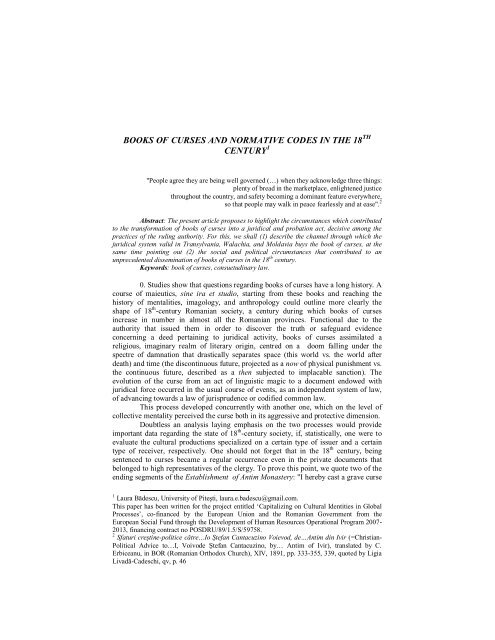language and literature european landmarks of identity
language and literature european landmarks of identity
language and literature european landmarks of identity
You also want an ePaper? Increase the reach of your titles
YUMPU automatically turns print PDFs into web optimized ePapers that Google loves.
BOOKS OF CURSES AND NORMATIVE CODES IN THE 18 TH<br />
CENTURY 1<br />
"People agree they are being well governed (…) when they acknowledge three things:<br />
plenty <strong>of</strong> bread in the marketplace, enlightened justice<br />
throughout the country, <strong>and</strong> safety becoming a dominant feature everywhere,<br />
so that people may walk in peace fearlessly <strong>and</strong> at ease". 2<br />
Abstract: The present article proposes to highlight the circumstances which contributed<br />
to the transformation <strong>of</strong> books <strong>of</strong> curses into a juridical <strong>and</strong> probation act, decisive among the<br />
practices <strong>of</strong> the ruling authority. For this, we shall (1) describe the channel through which the<br />
juridical system valid in Transylvania, Walachia, <strong>and</strong> Moldavia buys the book <strong>of</strong> curses, at the<br />
same time pointing out (2) the social <strong>and</strong> political circumstances that contributed to an<br />
unprecedented dissemination <strong>of</strong> books <strong>of</strong> curses in the 18 th century.<br />
Keywords: book <strong>of</strong> curses, consuetudinary law.<br />
0. Studies show that questions regarding books <strong>of</strong> curses have a long history. A<br />
course <strong>of</strong> maieutics, sine ira et studio, starting from these books <strong>and</strong> reaching the<br />
history <strong>of</strong> mentalities, imagology, <strong>and</strong> anthropology could outline more clearly the<br />
shape <strong>of</strong> 18 th -century Romanian society, a century during which books <strong>of</strong> curses<br />
increase in number in almost all the Romanian provinces. Functional due to the<br />
authority that issued them in order to discover the truth or safeguard evidence<br />
concerning a deed pertaining to juridical activity, books <strong>of</strong> curses assimilated a<br />
religious, imaginary realm <strong>of</strong> literary origin, centred on a doom falling under the<br />
spectre <strong>of</strong> damnation that drastically separates space (this world vs. the world after<br />
death) <strong>and</strong> time (the discontinuous future, projected as a now <strong>of</strong> physical punishment vs.<br />
the continuous future, described as a then subjected to implacable sanction). The<br />
evolution <strong>of</strong> the curse from an act <strong>of</strong> linguistic magic to a document endowed with<br />
juridical force occurred in the usual course <strong>of</strong> events, as an independent system <strong>of</strong> law,<br />
<strong>of</strong> advancing towards a law <strong>of</strong> jurisprudence or codified common law.<br />
This process developed concurrently with another one, which on the level <strong>of</strong><br />
collective mentality perceived the curse both in its aggressive <strong>and</strong> protective dimension.<br />
Doubtless an analysis laying emphasis on the two processes would provide<br />
important data regarding the state <strong>of</strong> 18 th -century society, if, statistically, one were to<br />
evaluate the cultural productions specialized on a certain type <strong>of</strong> issuer <strong>and</strong> a certain<br />
type <strong>of</strong> receiver, respectively. One should not forget that in the 18 th century, being<br />
sentenced to curses became a regular occurrence even in the private documents that<br />
belonged to high representatives <strong>of</strong> the clergy. To prove this point, we quote two <strong>of</strong> the<br />
ending segments <strong>of</strong> the Establishment <strong>of</strong> Antim Monastery: "I hereby cast a grave curse<br />
1 Laura Bădescu, University <strong>of</strong> Piteşti, laura.e.badescu@gmail.com.<br />
This paper has been written for the project entitled ‘Capitalizing on Cultural Identities in Global<br />
Processes’, co-financed by the European Union <strong>and</strong> the Romanian Government from the<br />
European Social Fund through the Development <strong>of</strong> Human Resources Operational Program 2007-<br />
2013, financing contract no POSDRU/89/1.5/S/59758.<br />
2 Sfaturi creştine-politice către…Io Ştefan Cantacuzino Voievod, de…Antim din Ivir (=Christian-<br />
Political Advice to…I, Voivode Ştefan Cantacuzino, by… Antim <strong>of</strong> Ivir), translated by C.<br />
Erbiceanu, in BOR (Romanian Orthodox Church), XIV, 1891, pp. 333-355, 339, quoted by Ligia<br />
Livadă-Cadeschi, qv, p. 46


